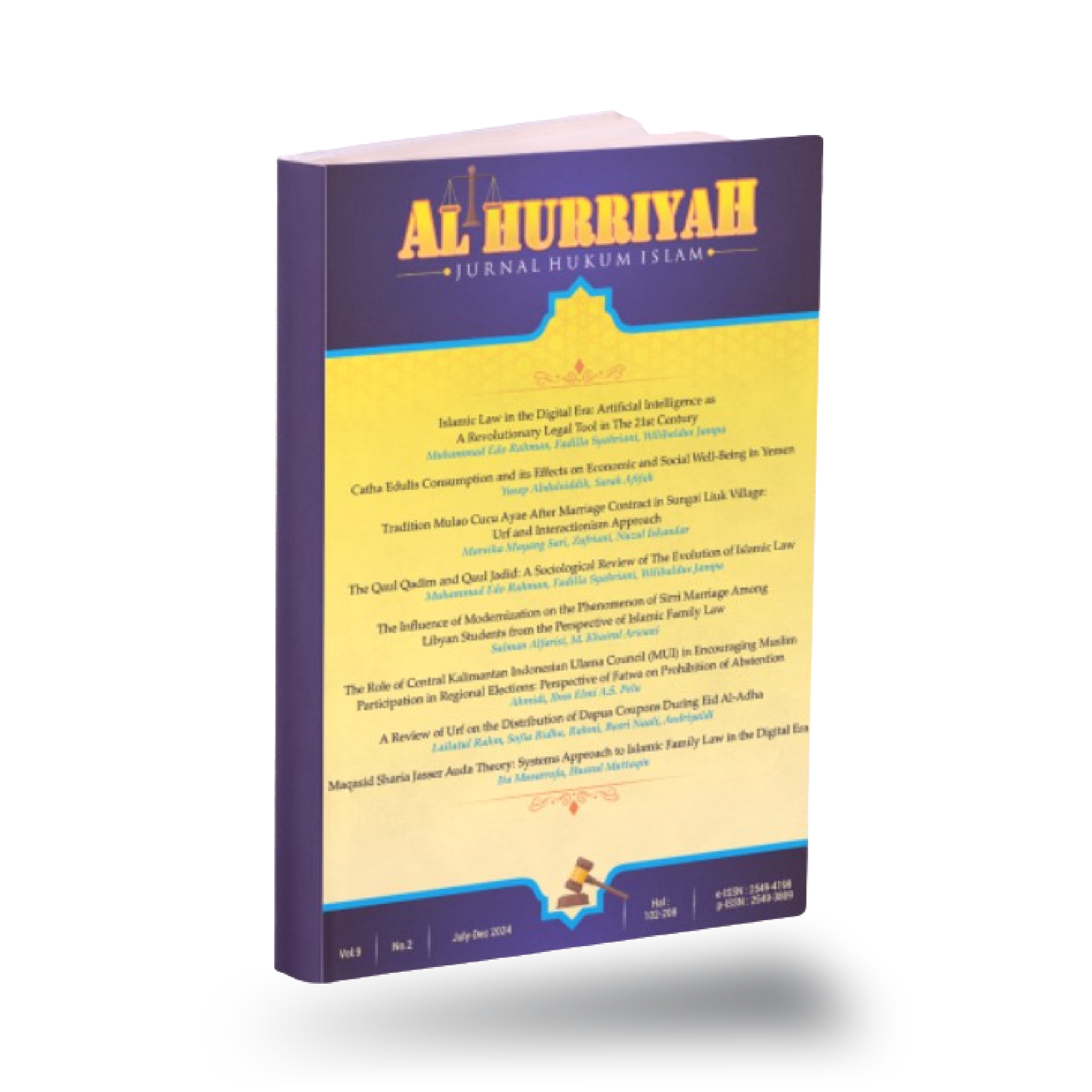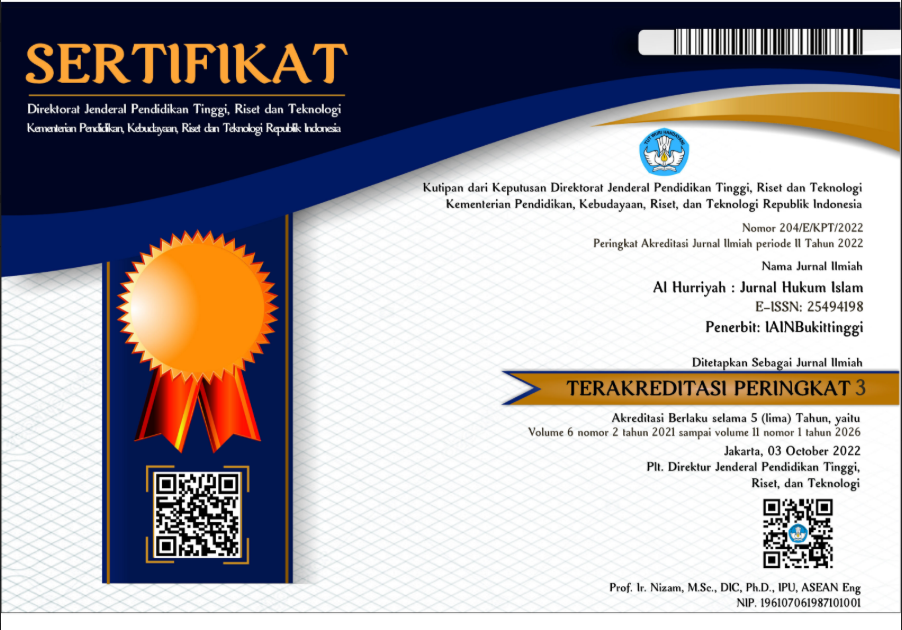Contextualization of Maqashid Sharia Towards the Use of Sex Toys for Married Couples
DOI:
https://doi.org/10.30983/al%20hurriyah.v8i1.6189Keywords:
Sex Toys, Married Couple, Maqashid ShariaAbstract
References
Abidin, Zainul, Analisis Hukum Islam Terhadap Penggunaan Alat Perangsang Seks Bagi Pasangan Suami Istri (Surabaya : fakultas syariah IAIN Sunan Ampel, 2010)
Al-Baihaqi, Syu’ab Al-Iman, Jilid 7, (Riyadh: Maktabah al-Rasyid, 2003) Cet. ke-1, 330.
al-Khadimi, Nur al-Din ibn Mukhtar, Ilm al-Maqashid al-Syari’ah, (Riyadh: Maktabah al-Abikan, 2001), cet. Ke-1
Al-Syathibi, Abu Ishaq, Al-Muwafaqat Fi Ushul Al-Syari’ah, Juz II, (Mesir: Maktabah al-Tijariah al-Kubra, tth)
Dimyati, Muhammad Syata, I’anatut A t-Thalibin, Jilid IV, (Beirut: Dar al-Fikr, t.th)
Hanbal, Ahmad ibn, Musnad Ahmad ibn Hanbal, Juz 5, (Beirut : Dar al-Fikr, tth)
Jurjawi, Ali Ahmad, Hikmah Al-Tasyrik Wa Falsafatuhu, Jilid II, (Beirut: Dar al-fikr, tth)
Marditia, Putri Purbasari Raharningtyas, ‘Tanggungjawab Hukum Marketplace Terhadap Pemasaran Alat Bantu Seksual Di Bawah Umur’, Meta-Yuridis, Vol.5, No.2, (2022)
Muslim, Shahih Muslim, Juz I, (Beirut: Dar al-Fikr, 1992)
Prakoso, R. Gilang Warih, Analisis Yuridis Pasal 533 Ayat (3) KUHP Jo.Pasal 27 Ayat (1) UU No. 11 Tahun 2008 Tentang Informasi Dan Transaksi Elektronik Terkait Penjualan Seks Toys (Alat Bantu Seksual) Melalui Media Online Di Indonesia (Malang, Fakultas Hukum Universitas brawijaya, 2016)
Qardhawi, Yusuf, Fatwa-Fatwa Kontemporer, Judul Asli Hady Al-Islam Fatawi Mua’sirah, Terjemah As'ad Yasin, Jilid I, (Jakarta: Gema Insani Pers, 1995)
Qardhawi, Yusuf, Halal Haram Dalam Islam (Surakarta: Akbar Media Eka Sarana, 2004)
Qardhawi, Yusuf, Halal Haram Dalam Islam Ter, Wahid Ahmadi, (Surakarta: Era Intermedia, 2000)
Sarwat, Ahmad, Maqashid Syariah (Jakarta: Fiqih Publishing, 2019)
Shiddiq, Ghofar, ‘Teori Maqashid Al-Syariah Dalam Hukum Islam’, Jurnal asy-Syariah, Vol. XLIV, No.118 (Juni-Agustus 2009).
Trianto, Titik Tri Wulan, Poligami Perspektif Perikatan Nikah (Jakarta: Prestasi Pustaka Publisher, 2007)
Trigiyono, Ali, Hukum Onani Perspektif Perbandingan Madzhab, Jurnal Hukum Islam, vol.1, No.11 (2013)
Zuhaili, Wahbah Al-, Fiqh Islam Wa Adillatuhu, Jilid 7, Terj. Abdul hayyie al-Kattani, (Depok: Gema Insani Press, 2011)
Downloads
Published
How to Cite
Issue
Section
Citation Check
License
Copyright (c) 2023 Wiwi Juniarti, Shafra Shafra

This work is licensed under a Creative Commons Attribution-ShareAlike 4.0 International License.
Authors who publish with this journal agree to the following terms:
- Authors retain copyright and grant the journal right of first publication with the work simultaneously licensed under a Creative Commons Attribution-ShareAlike 4.0 International License that allows others to share the work with an acknowledgment of the work's authorship and initial publication in this journal.
- Authors are able to enter into separate, additional contractual arrangements for the non-exclusive distribution of the journal's published version of the work (e.g., post it to an institutional repository or publish it in a book), with an acknowledgment of its initial publication in this journal.
- Authors are permitted and encouraged to post their work online (e.g., in institutional repositories or on their website) prior to and during the submission process, as it can lead to productive exchanges, as well as earlier and greater citation of published work (See The Effect of Open Access).





